Booker Prize winner Paul Lynch's unique Auraist interview on the language of fascist horror
'Literary style should be a way of knowing how the world is met in its unfolding.'
The Booker Prize winner was announced on Sunday November 26, and this year saw the crowning of a true master sentence-builder. Below is Paul Lynch’s only in-depth interview on the prose style of Prophet Song.
'Literary style should be a way of knowing how the world is met in its unfolding.’ Paul Lynch’s Booker acceptance speech:
The Prophet in His Own Land
By Peter Murphy
Prophet Song is a terrifying book – this much you’ll have gathered from peer blurbs, readers’ reports and media reviews. Paul Lynch’s fifth novel comes direct from the can’t-happen-here school of near-future dystopian, but the book’s real mojo originates not with the plausibility of the premise (the Republic of Ireland deteriorating rapidly from right-wing populism to outright civil war), but the crawling-on-skin effect of the language.
Prophet Song is a 300-page panic attack. It starts with a hum of dread, as the main protagonist Eilish’s denial gives way to the realisation that her country’s government is morphing into a murderous regime. Her husband, a union leader, has been interned by authorities, and her eldest son is eligible for conscription. Eilish repeatedly talks herself out of evasive action (in this case, the chance to flee the country), because she’s paralysed by disbelief and dismay. She has a career to attend to, an elderly father to watch out for, children to rear, until one day she is forced to admit that the parameters of her life have been redrawn into an inconceivable new normal where school runs and kids’ bellyaches are supplanted by airstrikes and abductions.
There’s a horrible sinking feeling about halfway through the book when rebel forces finally appear and seize ground in the capital, and we realise that they may be cut from the same treacherous cloth as their oppressors. There’s an even more horrible moment at the conclusion, an evil circularity, as the privileged citizens of a North-western European state become the very boat people they once bickered about, prey to war profiteers and human traffickers. If the Booker judges were looking for the novel of our time, they couldn’t have asked for a more relevant candidate.
Lynch achieves all these effects through prose mastery. The register he strikes is somewhere between the rising anxiety of classic noir (James M. Cain or Jim Thompson) and the high formalism of a McCarthy or a Woodrell. There’s not an ordinary sentence in the book. Lynch thinks himself so deeply into his protagonists’ mind-states that the narrative transcends the emotional and the visceral to become a sort of philosophical abstraction. A scene at the beginning of chapter 8, in which Eilish leaves the house to search for her son Bailey, only to blunder into an explosion, is particularly nerve-rattling:
‘… she is moving for the front door with Bailey’s name in her mouth, her hand sliding open the patio door, her eyes reaching for the street thinking there is no milk to be bought when soundlessly she is raised from her feet and borne through the air rearwards with her arms held out in some counter-time of light and darkness holding pieces of cement in her mouth. She is lying in a mute darkness beneath an immense and flattening silence. Something rests inside her mouth that is not blood, blood rising around the bitten tongue, the blood building around what lies in the mouth, it is not cement but something else, her eyes opening to the hallway clouded with glass and dust and Molly leaning over her to lift the bicycle off her body while holding Ben in her arm, Molly shouting with a silent mouth and Eilish cannot understand as she is pulled by the wrist into sitting up.
Paul Lynch’s initial literary project, pursued over his first three books, was to recast the rural Irish novel in a highly stylised prose informed by American masters, North and South. He was born in Limerick in 1977, grew up in Donegal, and moved to Dublin, where he worked as chief film critic for Ireland’s Sunday Tribune newspaper from 2007 to 2011. This background was a notable influence on his first novel Red Sky in Morning, which might be described as No Country for Old Men set in colonial Ireland. His second book The Black Snow, located in Donegal in the spring of 1945, was more Russian or European in tone. Its protagonist, the black-browed, stubborn Barnabas Kane, was a tragic Shakespearian figure in his isolation, somewhere between the Bull McCabe and Captain Ahab. The opening section, describing a catastrophic farmhouse fire, was enough to establish Lynch as one of most accomplished sentence-level writers in the country:
‘He came upon the pasture field and what he saw was a helix of black smoke that hid the house, spread like squid ink in water. The west end of the byre’s roof was blazing. Smoke sidled from its windows like water streaming backwards over rocks, curled towards the roof where it made with darker smoke a sickening union.’
The prize-winning Grace followed, a Famine-period work whose sense of movement and historical scope was evocative of Stevenson’s Kidnapped, with a classic steely tomboy protagonist akin to Mattie Ross from True Grit. Beyond the Sea (2019), signified a departure. The present-day story of two Mexican fishermen, Bolivar and Hector, stranded at sea after a sudden storm, it was a survival tale in which all existence is reduced to the bare essentials, food and water, the novel’s central paradox being that its sense of space, its apprehension of the infinite, rendered it close to claustrophobic cosmic horror. I interviewed Lynch about his writing practice around that time, and was particularly interested in how the habit of meditation enhanced his ability to sink so deeply his characters’ realities.
‘There’s been something at work always within the writing which perhaps accounts for what people think of as a certain kind of intensity,’ he told me. ‘I’m always trying to alert the reader to the moment, I’m trying to articulate the passing moment. And around the time I was writing Grace I moved my writing into the present tense because I realised that I could get even closer to that instant, to the now.
‘I think as a writer what you always look for is a story that cuts the cleanest line through to your preoccupations. Something is set off, and you have to be alert to that, and that’s when you know you have a story or a novel or something that needs to be explored. And I realised with Beyond the Sea that I could begin in the present moment. I just write novels, I don’t think of them as contemporary or historical, they’re almost meaningless terms, but it does begin in the contemprary, and it moves out into a mythic space, a place where time falls away. The characters are left with just themselves, and confronted with who they truly are, their deepest nature begins to emerge.
‘The fundamental dignity of the individual is something I’ve always thought about in my writing. I’ll always take a character and put them up against something that’s really going to test their dignity. And there’s this tension in my writing, which is these characters who are fighting and striving for their dignity within a hostile or indifferent world that has absolutely no recognition of their existence. The humanistic view that all of us are intrinsically important and that we generate meaning, versus the post-human view that we have no meaning whatsoever.’
Out of that preoccupation comes Prophet Song, which, like its predecessors, has numerous cinematic equivalents: the horrifying kitchen sink realism of Threads, the shellshocked trauma of Come and See, the relentless impetus of Alfonso Cuaron’s (almost) continuous eleven-minute shot in the last act of Children of Men. Yet, for all its terrors, Prophet Song is Lynch’s most commercially successful work to date. I wrote to him shortly after his being longlisted for the Booker. Ever the stonecutter, he asked if we could conduct our interview by email.
Read on.
Peter Murphy: What was the spur to move your writing from period-rural or maritime novel to a near future (sub)urban setting?
Paul Lynch: To speak about such matters is to rationalise after the fact. For me, art begins as feeling, an intuitive act that must be divined onto the page. I don’t choose the novels. What I’m seeking always is a story that can contain my obsessions, a sense of great mass and energy hiding behind an opening scene. I found Prophet Song after spending six months writing the wrong book. One Friday afternoon, I closed the document and said this is the wrong novel, I will start something new on Monday. I could sense there was something else there, but what, I didn’t know. On Monday morning I sat down and wrote the first page of Prophet Song pretty close to what you can read now. That’s a deeply intuitive act and those first sentences were deeply encoded and speak symbolically to the meaning of the book, and yet I could not have known at that time what I was embarking on.
Tell me about the register of the language. The vocabulary, the syntax, the pace.
The initial register of the language is part of that intuitive act and everything else follows from there. I don’t subscribe to the ideology of Flaubertian realism though I admire it as a reader. Excessive adherence to formalism does not reflect life, and so my sentences must be protean. Literary style should be a way of knowing how the world is met in its unfolding. And so I shape my sentences around the truth of the unfolding — in other words, my realism is memetic and presses its way into feeling, atmosphere, emotion, etc. Vocabulary, syntax etc., like mobilised troops, follow this initial command.
Many of the more frightening aspects of this book’s world: the political dogma/extremism, the suspicion, the fear of being ‘lifted’, are as relevant to The Troubles era (and the Soviet Bloc before it) as they are our 21st-century phobias. Was this in the forefront of your mind?
I had wanted to use as an epigraph to the book a line from Cormac McCarthy’s The Crossing which would have established the book’s intentions, but he was dying at the time and we couldn’t get permission in time for publication. McCarthy wrote: “The task of the narrator is not an easy one… He appears to be required to choose his tale from among the many that are possible. But of course that is not the case. The case is rather to make many of the one”.
The book began in my mind with thoughts of Syria, but as the writing deepened, it became clear that I was crafting a novel that could speak at once to multiple political realities, past, present and future. That’s the goal if you are writer — the closer you can get to myth, the more universal freight the story can carry. The realities portrayed in this book are universals, and represent not some imminent threat, but what we are always, and what we continue to do to be. There is a moment towards the end where Eilish realises this for herself and the true meaning of the title Prophet Song becomes clear.
Was there any one spark for this book? An image or a real-life occcurrence?
My editor Juliet Mabey of Oneworld has poked fun at me for alluding to at least three ‘origin stories’ for this book in different interviews. This isn’t intentional. The truth is, you don’t sit down with one single idea in mind. When I find a novel, it is the result of many months, or years, of different ideas nucleating around a central obsession. They begin to coalesce, often subconsciously, until I sit down to write. In other words, I write and follow the images.
In 2018, there was a profound sense of chaos and political disruption, but deeper than that, I could sense an unspoken and unacknowledged spiritual crisis unfolding across the west. I also remember a quote by Rudolph Giuliani where he said, ‘truth is not truth’, and at that point I could see we were skirting the abyss.
Around that time, I was reading George Elliot’s Silas Marner and there is a scene where Silas has a ‘cataleptic fit’ during a prayer meeting and ‘another member observed that this trance looked more like a visitation of Satan than a proof of divine favour, and exhorted his friend to see that he has no accursed thing within his soul.’ I began to think about this ingenious accusation, and it evolved into a political question where Larry (living until now within a liberal democracy) is asked by the newly formed secret police to prove that his behaviour as trade unionist is not seditious towards the state.
Is this book a response to ‘new father’ fear, that terror of the world that comes with parenthood, that Amis spoke about?
Not at all, though I did realise later on that perhaps I wasn’t truly writing this book for my generation or older, who are within living memory, or living record, of the horrors of the 20th century. I may have been writing for a reader who does not remember, whoever that may be.
Was it draining to sustain the atmosphere of dread and anxiety that underpins the book, or could you keep it quarantined in the work?
Writing is draining, full stop. Though the atmosphere of dread and anxiety that I hope the reader feels is a product of the form that enmeshes the work. What goes into the novel’s form? For a start, there are the long sentences and there are no paragraph breaks in the book. There is a deep undertow of inevitability at work, a sense of inevitability, and the long sentences and the lack of breaks lock the reader into the same claustrophobic space that Eilish inhabits. She is straitjacketed by events, and has nowhere to turn and is carried onwards by the sense of rolling momentum. So too, the reader, pulled ever onwards by the rolling sentences, locked into the text with no breathing space. It was also important to keep to the background the politics, the true nature of the threat. What lies unseen or beyond our comprehension belongs to the sublime and therein lies our feelings of terror.
What were your benchmarks of excellence, in terms of writers or novels, this time out? What were the totem books in relation to Prophet Song?
I used to have touchstones for every book. When I teach creative writing, I remind students that a shelf of classics is a source of energy and great works raise your consciousness and remind you of what the standard is. And if you spend all your time reading nothing else but contemporary fiction, you will have no concept of what the standard is. It can be hard work, too, to sustain the standard when you are digging through hard rock for three or four years. With this book, however, I sensed I had pushed out into a space that was truly my own and there were no totemic novels that I consciously used as guidance. There were, of course, novels I was aware of that had shown me how this kind of novel might be done — Saramago’s Blindness for one, McCarthy’s The Road is another — but they weren’t direct influences. And Virginia Woolf was in my thoughts in the more intimate sections involving Eilish. However, I could sense in the enormous energy of this book that it was doing something unique and that I had reached my own terra incognita. I’ve seen that others have compared this book to Orwell or Atwood, but they were not in my thoughts. I consider those classic ‘dystopian’ novels political in direction, whereas Prophet Song, along with novels such as Blindness and The Road, is metaphysical.
How much deliberation did you do over the choice of occupation, the teachers’ union, at the heart of the story?
How do we define the liberal democracies so many of us have grown up in, the democracies we have taken for granted? One way of doing it might be to say that we all enjoy the right to march and make our opinion heard. When the right to march ends, we are in deep trouble. That is the tipping point for this novel. It is the tipping point for all democracies.
Could you recommend other well-written books, old and new, and also to name your favourite well-written passages?
Though the night sky is so full of stars, I find myself returning frequently to Conrad and Faulkner. As I Lay Dying is a book worth savouring slowly as it has writing of such extraordinary texture, intensity and penetration. At times, Faulkner seems to be pushing past the known and the visible into some other dimension. His noticing is unsurpassed: ‘The lantern sits on a stump. Rusted, grease-fouled, its cracked chimney smeared on one side with a soaring smudge of soot, it sheds a feeble and sultry glare upon the trestles and the boards and the adjacent earth. Upon the dark ground the chips look like random smears of soft pale paint on a black canvas. The boards look like long smooth tatters torn from the flat darkness and turned backside out.’
Conrad has an extraordinary ability for crafting an image that speaks to a profound metaphysical truth. There is a passage in Typhoon where the boatswain, in the midst of a storm, drops into a black coal bunker — black within black — and then proceeds to the hold which is full of Chinese coolies returning home after years away doing hard labour. As the ship is tossed by the high seas, their money chests have been smashed open and in the darkness of the hull, in the midst of the storm, they are tossed into a single mass of limb and belongings, fighting each other over their silver coins. And there you have Conrad’s vision of man.
Any prose tips Auraist readers won’t have seen elsewhere? Pet peeves, etc?
I have noticed a trend in contemporary fiction where certain writers do away with one aspect or another of traditional grammar or formatting without any justification within the book’s form for doing so. It’s the worst kind of pretentiousness. Every decision you make in the writing of your fiction must associate back to the meaning at the heart of the text.
We receive no commissions for purchases made through our site, so would be grateful if you could support us by sharing Auraist with your friends.
Paul Lynch is the internationally-acclaimed, prize-winning author of five novels: PROPHET SONG, BEYOND THE SEA, GRACE, THE BLACK SNOW and RED SKY IN MORNING, and the winner of the Kerry Group Irish Novel of the Year 2018, among other prizes.
PROPHET SONG was published to ravishing praise in August 2023 and was shortlisted for the Booker Prize and the An Post Irish Novel of the Year. John Boyne in The Sunday Independent called Prophet Song "entirely original". The Observer called the book "a crucial book for our current times... brilliant, haunting". The TLS called it "thunderously powerful". The Guardian called it "an urgent, important read". The Literary Review called the book "a masterly novel".
Paul Lynch was born in Limerick in 1977, grew up in Co Donegal, and lives in Dublin. He was previously the chief film critic of Ireland’s Sunday Tribune newspaper from 2007 to 2011, and wrote regularly for The Sunday Times on cinema. He is a full-time novelist.
Peter Murphy – aka Cursed Murphy – is a writer, musician and journalist from Wexford, Ireland. He is the author of two novels, John the Revelator and Shall We Gather at the River (Faber) and numerous short stories, including the audio-drama The Hands of Franky Machine. His work has been published and translated worldwide, and his journalism and non-fiction have appeared in Rolling Stone, the Guardian, the Irish Times, Hot Press, Stinging Fly and Winter Papers, among other publications. He performs and records with the punk-poetry art-rock troupe Cursed Murphy Versus the Resistance, who have released two albums to date, the eponymous debut (2020) and Republic of the Weird (2022). Peter is currently writing his third book, working title Ghost Voltage.
Have we missed any especially well-written recent releases in literary fiction, speculative fiction, crime fiction, or nonfiction? Email us at auraist@substack.com, quoting the first 300 words of your recommended book.


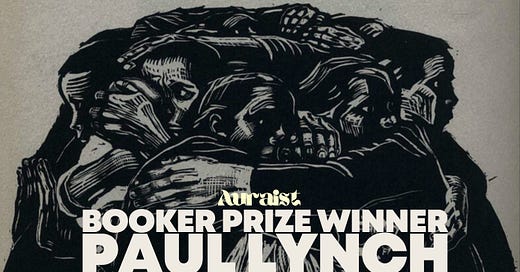


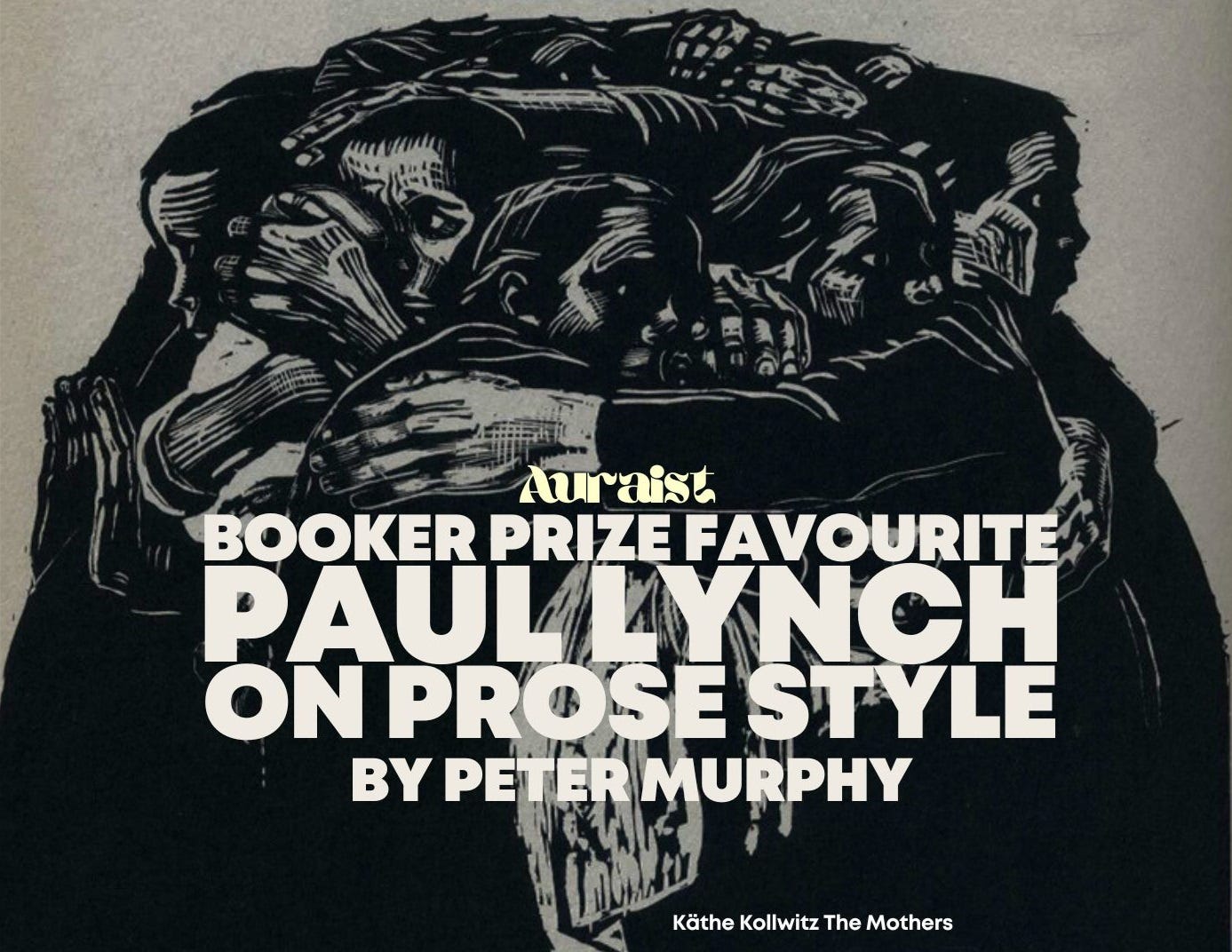

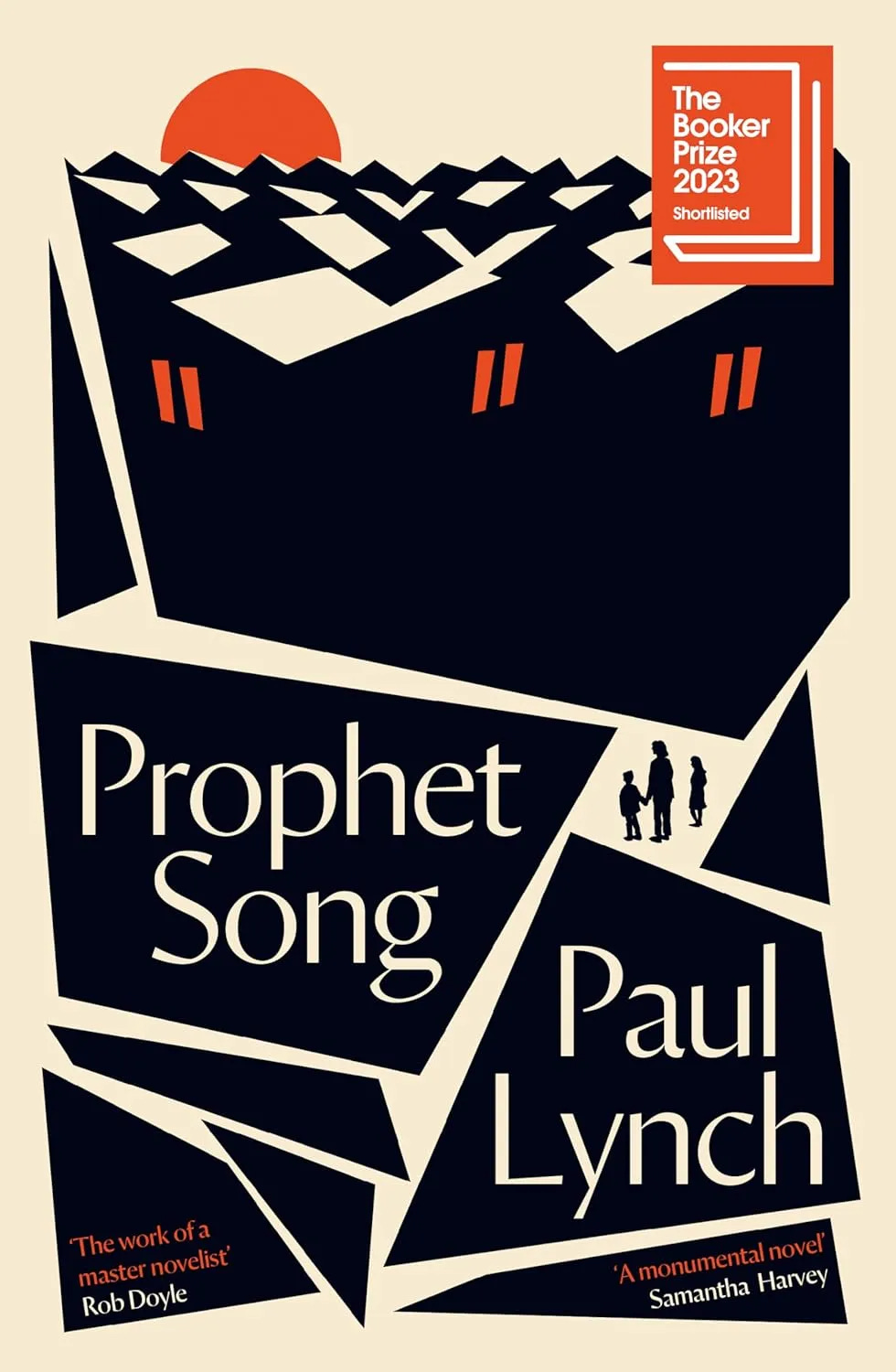
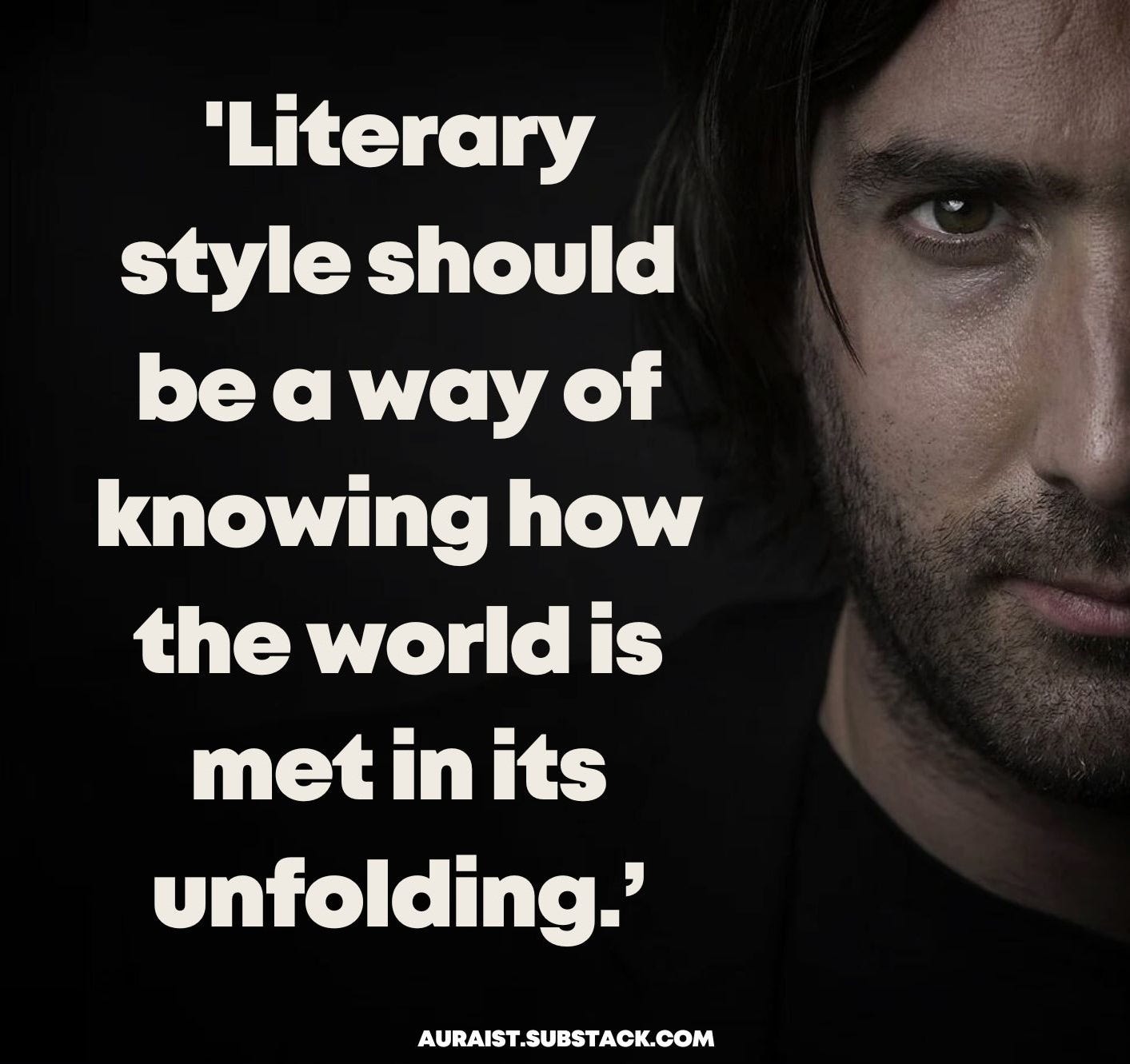
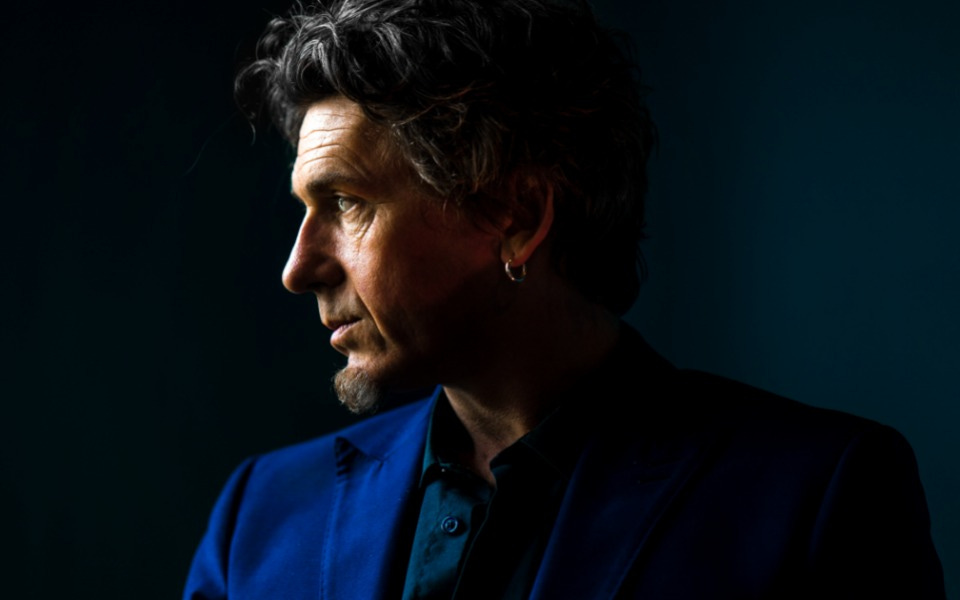

"To speak about such matters is to rationalize after the fact."
Agreed. Most of the time, my writing decisions happen subconsciously.
I have to say, Prophet Song is one of the finest novels of our time. Our generation's 1984, yet brilliant in its own right. I devoured it in just a few days. There are moments of deep heartbreak that stay with you long after you finish.
Funny thing, Eilish Stack wrote a review for my book. It's on the back cover.
Small world.